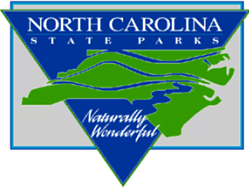Division of Parks and Recreation
Environmental Sustainability Initiatives

The Division of Parks and Recreation has implemented a number of initiatives with the long-term goal of ensuring environmentally sustainable practices in environmental education both through the certification of field staff as environmental educators and by increasing the number of workshops focusing on sustainable issues; through the use of alternative fuel vehicles and by educating the public in the benefits of alternative fuel vehicles; by incorporating sustainable practices into repair, renovation, and construction projects; and by incorporating environmental sustainability into the early planning stages of park designs.
 |
The
Division of Parks and Recreation has established a requirement for all
field staff (rangers and superintendents) to become certified
environmental educators. At
this time, 17% of the field staff have achieved environmental education
certification. These certified
environmental educators are now training other Division field staff as
well as educators and visitors.
|
| Additionally,
a new initiative has been recommended for the Divisionís Interpretation
Education Program to include sustainability topics in future I&E
skills training classes for field staff, in any future revisions to
existing Environmental Education Learning Experiences, and into any new
Environmental Education Learning Experiences.
Find out more about Environmental Education Learning Experiences at
State Parks. A three-year grant from the Division of Air Quality has funded the lease and maintenance of an electric truck. Staff at Medoc Mountain State Park will use the truck within the boundaries of the park while performing routine maintenance. An exhibit focusing on both the benefits of the electric truck and on air quality monitoring is currently in the planning stage and will serve to educate the public on the benefits of alternative fuel vehicles and the importance of clean air. |

|
The Divisionís Construction Program is working with designers to ensure that construction projects incorporate environmentally sustainable practices into all aspects of design and construction. Conservation measures currently in use in new construction include low volume flush toilets, low-e glass for windows, extra insulation in exterior walls, insulated hot water lines, and high efficiency HVAC systems.
A new initiative has also been recommended for the Divisionís Comprehensive Planning Program to include sustainability in park designs to lessen impact on resources, to decrease fuel consumption, and to decrease noise pollution. Facilities will be clustered to reduce the amount of driving within our parks. Trails and buildings will be evaluated to ensure that there is minimum impact to the natural.
|
| Home Page | |